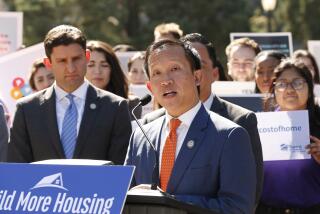Coalition Challenges Myanmar Trade Ban
- Share via
A coalition of major U.S. corporations opposed to the spread of citizen activism in foreign affairs filed a constitutional challenge in federal court Thursday of a Massachusetts law banning state purchases from companies doing business in the renegade nation of Myanmar.
The lawsuit by the Washington-based National Foreign Trade Council--whose 580 members include most big-name U.S. multinationals, including Myanmar investors Arco and Unocal--claims that such local statutes violate the U.S. Constitution, which gives the federal government the right to make foreign policy and regulate foreign commerce and is the “supreme law of the land.”
The suit filed in U.S. District Court in Boston has direct implications for similar laws in effect in Santa Monica, San Francisco, Berkeley and Oakland aimed at Myanmar investors. The city of Los Angeles is considering such a measure. Municipal officials in California who were contacted Thursday hadn’t heard of the lawsuit.
Until now, corporations have been reluctant to confront such local statutes for fear they would be portrayed as cheerleaders for repressive governments.
But the rapid spread of selective-purchasing measures has raised the stakes. Since December 1996, 28 state and local governments have enacted various purchasing laws targeting Nigeria, Switzerland, Indonesia and China in addition to Myanmar.
The success of the lawsuit hinges partly on whether the corporations can prove they have suffered damages as a result of Myanmar sanctions. To date, there have been widely publicized cases of companies such as Apple Computer and Mitsubishi Heavy Industries running afoul of these sanctions, but much of the damage has been in the form of “lost opportunities,” according to the trade council.
Dan O’Flaherty, vice president of the National Foreign Trade Council, said at least 30 of the council’s members have been put on the “blacklist” by Massachusetts officials and are willing to testify to the damages they have incurred if called upon by the court.
An official of Unocal Corp., a partner in a $1.2-billion pipeline and the largest U.S. investor in Myanmar, formerly known as Burma, said the firm “heartily supports” the lawsuit.
“The United States cannot and should not approach the world as 50 states and thousands of municipalities who embark on setting their own foreign policy whenever it suits them,” said David Garcia, a spokesman for the El Segundo-based oil company.
But defiant Massachusetts officials--who expect other state and local governments to join them in resisting the challenge--argued that such laws are a valid exercise of free speech and are allowed under the Constitution’s “market participant doctrine,” which gives cities and states the same rights as individuals to participate in the marketplace.
They portray this lawsuit--the first national challenge of such selective-purchasing measures--as an attack on state and local sovereignty by wealthy corporations motivated by greed. They point to the anti-apartheid campaign targeting South Africa as an example of grass-roots economic activism helping to overturn white minority rule.
“Massachusetts should play a role in trying to improve the human rights of the people of Burma, and I believe that the Constitution allows us to do so,” said Massachusetts Atty. Gen. Scott Harshbarger.
The Foreign Trade Council’s O’Flaherty said members don’t condone the harsh actions of the military regime in Myanmar, but believe “economic engagement” rather than isolation is the most effective way to influence authoritarian governments.
“I don’t think there’s anybody in this country who supports that government,” he said.
More to Read
Inside the business of entertainment
The Wide Shot brings you news, analysis and insights on everything from streaming wars to production — and what it all means for the future.
You may occasionally receive promotional content from the Los Angeles Times.









